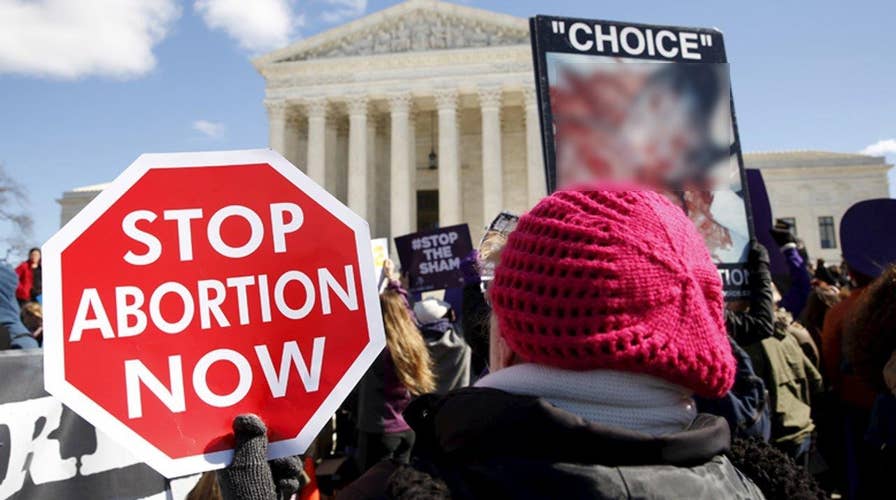Should abortionists be punished for doing their jobs?
Alan Colmes vs: Operation Rescue's Troy Newman on the reasons why he feels abortion is murder and that abortionists should be punished
Oklahoma lawmakers approved a sweeping and unprecedented measure on Thursday that would make performing an abortion a felony punishable by prison time -- part of an overt strategy to challenge the Roe v. Wade Supreme Court ruling.
The bill, which passed the Oklahoma Senate 32-12 without debate, now awaits either the governor’s signature or veto. Abortion-rights supporters say the measure is clearly unconstitutional, but the bill's author has said he hopes it will be a first step toward overturning the 1973 Roe ruling that legalized abortion.
“Since I believe life begins at conception, it should be protected, and I believe it's a core function of state government to defend that life from the beginning of conception,” Republican Sen. Nathan Dahm, the bill’s author, said.
Under the bill, doctors who perform abortions could face three years behind bars and lose their medical licenses. There are no exceptions in the case of rape or incest but consideration will be given if a mother’s life is in jeopardy.
The measure is already sparking outrage in the state.
Abortion rights supporters -- including the state’s medical association – argue the bill is unconstitutional and have vowed to fight it.
State Sen. Ervin Yen, the only doctor in the Senate and a Republican, described the legislation as “insane” and voted against it.
The Center for Reproductive Rights also slammed the bill, describing it as “cruel and unconstitutional.”
"Oklahoma politicians have made it their mission year after year to restrict women's access to vital health care services, yet this total ban on abortion is a new low," Amanda Allen, an attorney for the New York based center said in a statement. "The Center for Reproductive Rights is closely watching this bill and we strongly urge Governor Fallin to reject this cruel and unconstitutional ban."
Thursday's vote in the Senate comes as the Oklahoma Legislature nears a May 27 deadline for adjournment and is still grappling with a $1.3 billion budget hole that could lead to deep cuts to public schools, health care and the state's overcrowded prison system.
"Republicans don't have an answer for their failed education policies, failing health care policies and failing fiscal policies, so what do you do in that situation?" said Senate Democratic leader John Sparks. "You come up with an emotional distraction. That's what this bill is."
Nearly every year, Oklahoma lawmakers have passed bills imposing new restrictions on abortions, but many of those laws have never taken effect. In all, eight of the state's separate anti-abortion measures have been challenged in court as unconstitutional in the last five years.
While some in the state hope the issue returns to the Supreme Court, there is still a vacancy on the bench, with the court largely split 4-4 along ideological lines.
In 2013, the U.S. Supreme Court declined to hear a case over an overturned Oklahoma law that would have required women to view an ultrasound of her fetus before an abortion is performed. That same year, the Oklahoma Supreme Court struck down a law that would have effectively banned all drug-induced abortions in the state.
In 2014, the state Legislature approved a law requiring abortion doctors to have admitting privileges at nearby hospitals, but a challenge is pending before the Oklahoma Supreme Court.
Trust Women, a Wichita, Kansas-based abortion rights foundation that's building an abortion clinic in Oklahoma City, says it's "dismayed" by the passage of the procedure-performing bill, but is undeterred in its plans to open the center.
The Associated Press contributed to this report.





